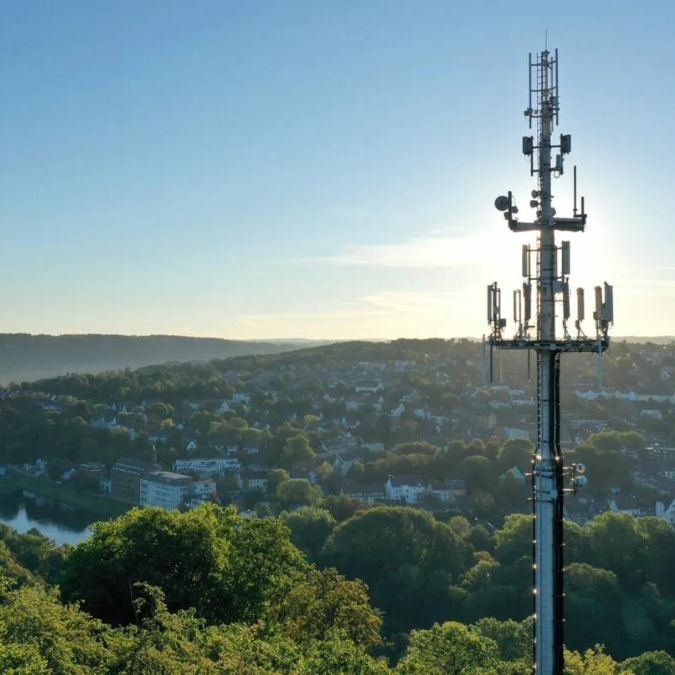The UK’s 5G rollout: a progress report
10 Apr, 20244 minsThe UK government is aiming for all populated areas in the UK to have standalone 5G coverage...

The UK government is aiming for all populated areas in the UK to have standalone 5G coverage by 2030. This is primarily being rolled-out by private mobile network operators; EE, O2, Vodafone and Three.
According to Ofcom 93 per cent of outdoor premises in the UK have 5G coverage from at least one mobile network operator (MNO), and 25 per cent are covered by them all
5G networks are initially being built on top of legacy 4G equipment. This is called ‘non-standalone’ 5G. While it can deliver enhanced mobile broadband, the more advanced uses for 5G will require ‘standalone’ networks. Deployment of standalone 5G, which utilises dedicated 5G equipment in all parts of the network, is at an early stage.
In the UK, we’re already seeing a lot of hype around 6G, despite the fact that 5G hasn’t even been rolled out yet. Companies like EE have promised 5G signal to over 90 per cent of the UK’s landmass by 2028 – a trajectory which hasn’t yet been reached, however we are still four years away from that deadline, so only time will tell.
If you ask people in cities, it’s likely that they would be happy with the rollout of 5G, but in more rural areas where 5G is arguably even more important to people’s connectivity needs, this wouldn’t be the case.
What is impacting the rollout?
Lack of resources
The slow rollout has been caused by a lack of resources - there is currently a global supply chain shortage, with prices being forced through the roof for networking equipment and backlogs of orders. The ban on Huawei mobile equipment no doubt further exacerbated the issue.
A shortage of skilled talent
We are also witnessing a shortage of skilled talent in the sector. The government is pumping phenomenal amounts into fibre infrastructure, which seems to be the preferred method of rolling out internet to most homes and businesses, causing many engineers to transition into the fibre engineering sector.
The balance between fibre and 5G candidates
Additionally, scores of candidates with experience with 5G, RAN, O-RAN require sponsorship to work in the UK, which only a small number of companies can provide. This is further constricting the talent pool and means that smaller companies are getting priced out of the market for talent, reducing competition.
Because 5G is a much more niche skillset, the percentage of candidates able to work with the technology isn’t high enough - whether that be from an installation perspective, maintenance or planning. Therefore, UK employers are often forced to hire more junior talent and train them, or to take candidates from different areas of telecommunications.
This could shift in the coming years, however. The fibre roll out in the UK is now slowing down with funding drying up or builds being completed in certain areas. We are therefore expecting to see fewer fibre engineers over time, as they transfer into areas such as mobile or EVs.
The impact of LEO Satellites
The emergence of LEO Satellites could also change the landscape in the coming years. This technology can offer a similar if not better service than 5G. Whilst Satellite ISPs are currently charging substantial fees for their services, this could significantly reduce over time, resulting in increasing numbers of consumers choosing them over Mobile Network Operators, as their provider of choice.
What next?
The UK government is clearly recognising the need to invest to telecoms and network infrastructure, joining the Global Coalition on Telecommunications (GCOT) back in October 2023 to enhance communication network resilience and is investing £70 million in advancing domestic next-gen telecom technology.
All of which, it is hoped, will help to ensure that communications networks can remain resilient and adaptable when confronted with challenges ranging from supply chain disruption to cyber-attacks, strengthening the UK’s ability to stay connected at the most critical times.
The Government is also the early phases of trying to make telecoms careers more visible, particularly to younger people, service leavers and those with disabilities, so we are hoping to see this making an impact on the skills shortage over the next 12 months.
If you’re interested in helping to further the UK’s connectivity, get in touch with our telecommunications team today, they would love to hear from you.




